The best way to explain digital marketing is with… a common household utensil.
We’re talking, of course, about marketing funnels. No matter who you are or what you do, users are going through your marketing funnel or sales funnel, and the various marketing tactics you use are what guide prospective customers toward a sale.
In recent years, “funnel marketing” has become trendy. This is a style of customer experience in which entrepreneurs create a marketing funnel with a series of landing pages, then measure a customer’s journey through each stage and track overall marketing funnel metrics. This is one type of marketing funnel, but it’s not the only type.
Key Takeaways
- A traditional marketing funnel consists of an awareness stage, a consideration stage, and a conversion stage.
- Defining these marketing funnel stages forces you to get specific about your ideal customer journey.
- A funnel may also include stages like referral, in which you engage existing loyal customers.
Let’s go through each stage of the funnel, along with why thinking in terms of funnels can help you bolster your overall marketing strategy.
What Is a Marketing Funnel?
A marketing funnel is a diagram that defines customer journeys. Users who interact with your business have varying degrees or awareness about your company or brand. By defining each stage of the funnel — and what moves users from the top to the bottom of the funnel — you’ll get more clear on what users want and will be able to create more targeted content.
Funnels help you define your marketing qualified leads (MQLs). These are the users who have shown they actually want to hear from you. Perhaps they’ve signed up for your email list, or they watched one or more videos that you ran as paid ads. By focusing your advertising on these MQLs, rather than the entire world, you’ll see more bang for your digital buck.
Marketing and sales teams are obsessed with measuring the number of MQLs and sales qualified leads (SQLs) in their funnel, because this information helps them decide what to focus on next to improve business performance.
The Stages of Marketing Funnels
Marketing funnels are typically divided into five stages: Awareness, consideration, conversion, retention, and referral.
No. 1: Awareness
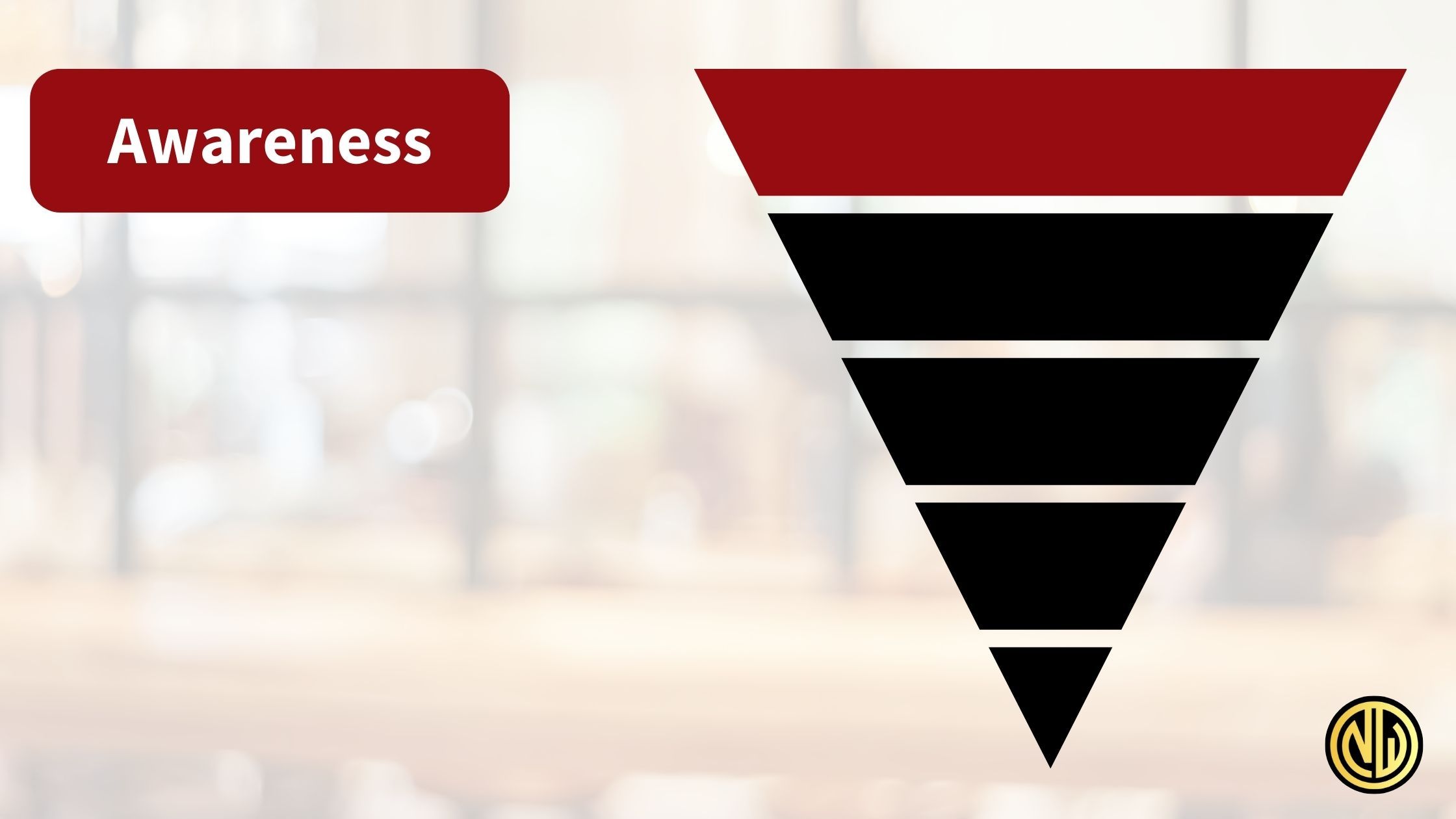
The awareness marketing funnel stage is also known as the top of the funnel. In it, your goal is to grab the attention of your target audience with various marketing campaigns. This can be done through various marketing channels such as social media, content marketing, keyword research and SEO, or paid advertising.
The key here is to create awareness and generate interest in your product or service. We are trying to make users aware that you exist in the first place. This stage is all about generating traffic to your brand or business.
No. 2: Consideration
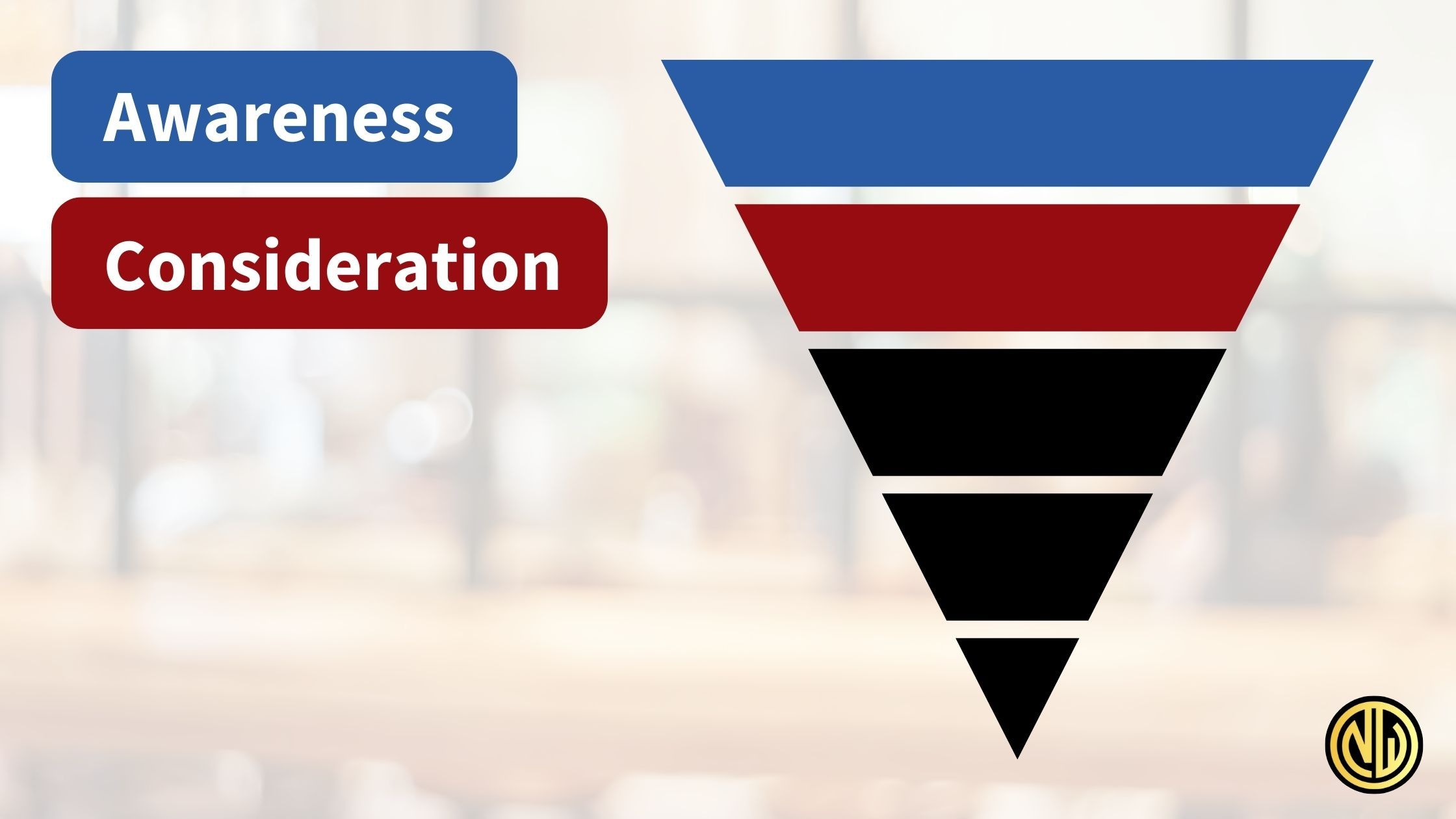
Once you have captured the attention of your potential customers, the next stage is to cultivate their interest through repetition. Focus on being seen by your target audience again and again so that they warm up to you.
This involves providing more information about your offering, highlighting its benefits, and addressing any concerns or objections they may have. Content marketing plays a crucial role in the consideration stage because it helps you nurture leads. You have to educate and engage your audience to help them overcome skepticism.
Cultivating an email list is great for consideration, because it lets you get back in front of interested readers, consistently, for free.
No. 3: Conversion
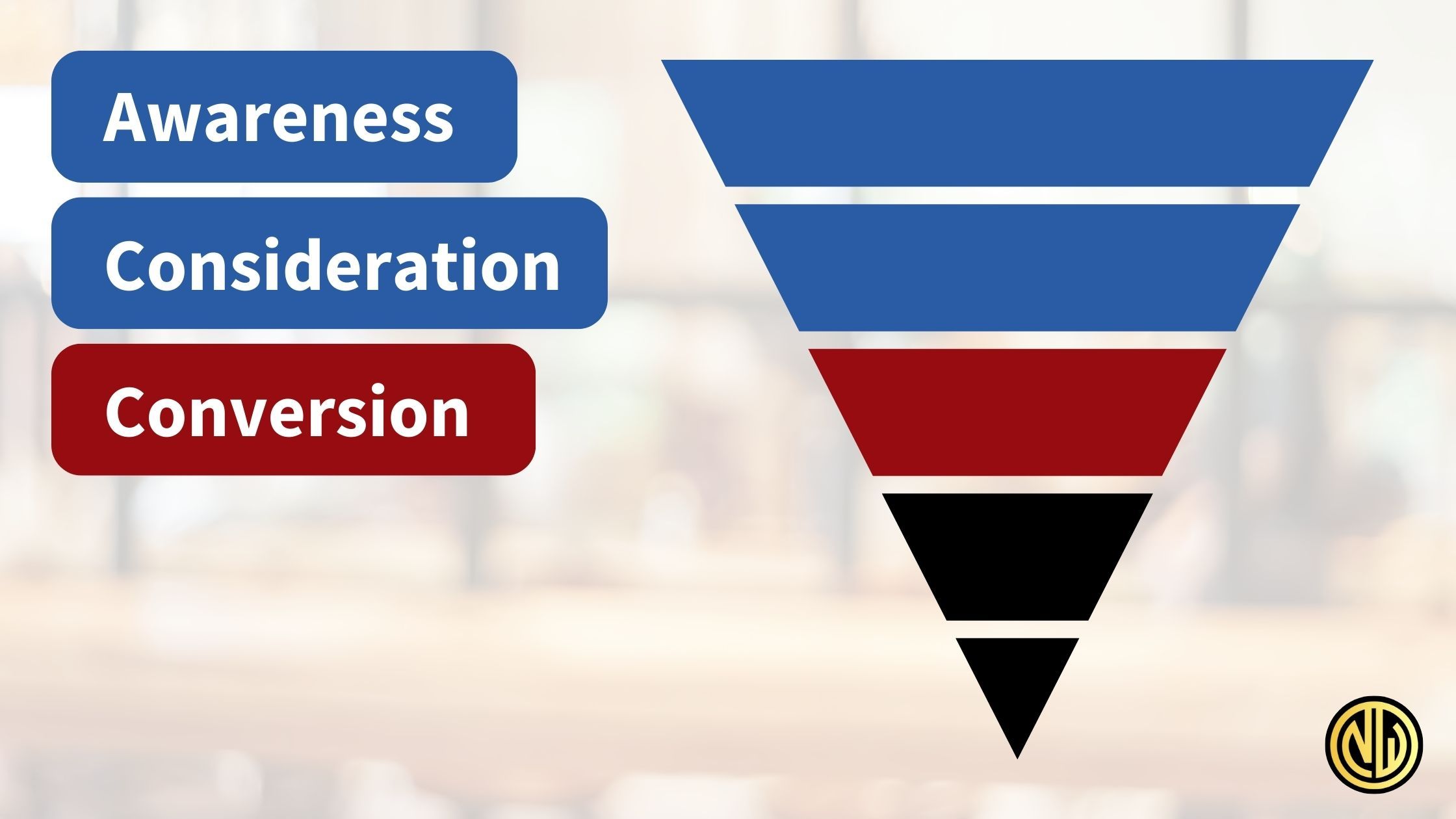
Eventually, we want your prospective customers to become actual customers. In most marketing funnels, a conversion is defined as a purchase. It may refer to some other sort of meaningful action, such as signing up for a discovery call or a demo.
In some businesses, these three steps comprise the entire funnel, and conversion is considered the bottom of the funnel. This type of funnel is sometimes called a conversion funnel for this reason.
No. 4: Retention
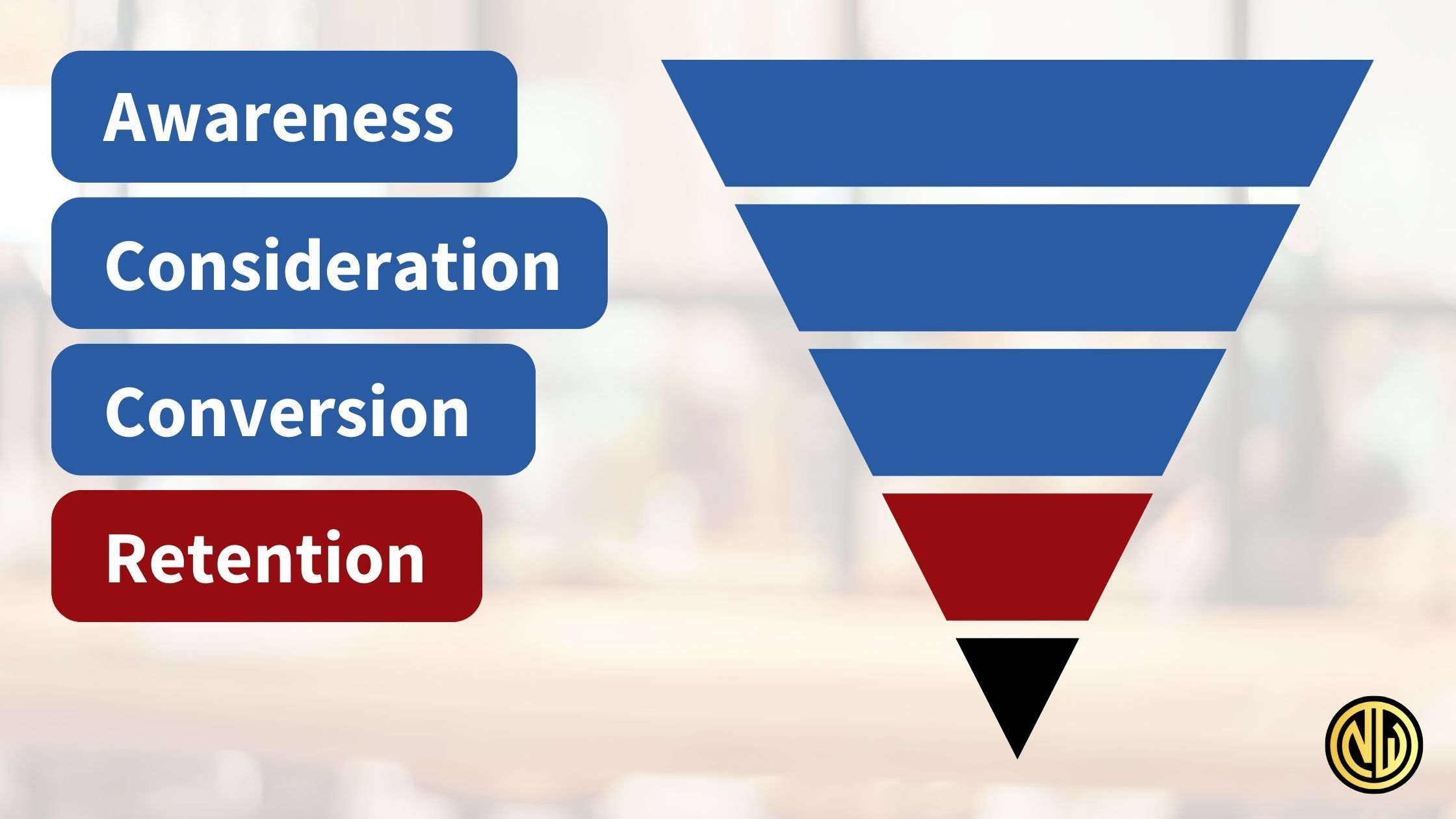
Successful marketing funnels go beyond the first purchase. They also focus on cultivating repeat customers and repeat transactions.
Think about the brands you love to buy from again and again. Why is that? Are there loyalty programs that keep you coming back for more? Is the product and/or customer service amazing?
Customer loyalty is very lucrative. It’s much cheaper to retain an existing customer than it is to attract a new one, and many successful businesses rely on repeat purchases to succeed.
No. 5: Referral
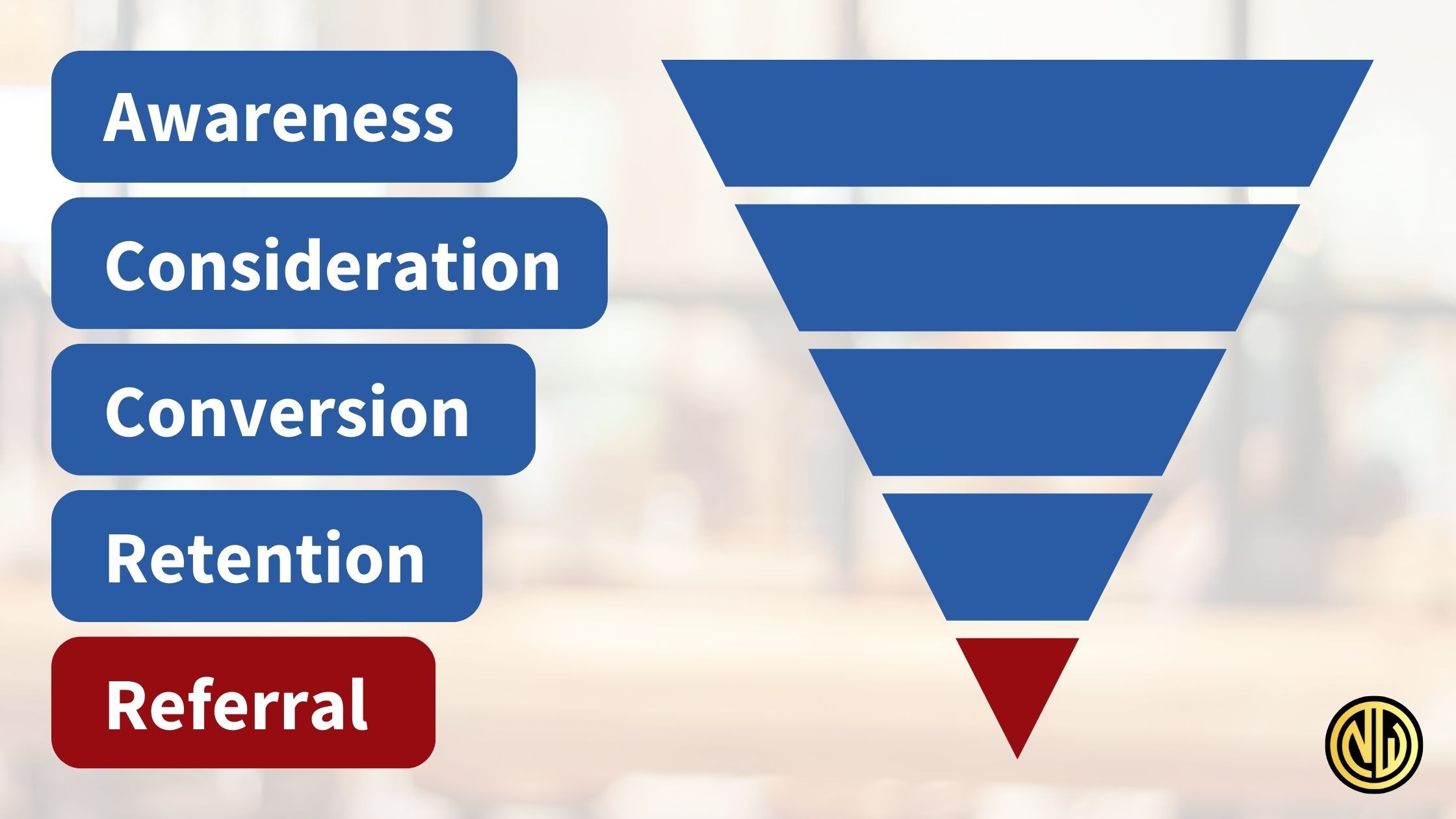
Your happiest customers will buy everything you sell and tell their friends to do the same. Think about how you can leverage these brand advocates. Consider capturing customer testimonials from your most loyal customers. You can create content from these assets later.
Marketing and Sales Funnel Frequently Asked Questions
What Are Funnels in Digital Marketing?
In traditional digital marketing, funnels refer to diagrams of the journey your potential customers will take. In recent years, a trend called “funnel marketing” has emerged, referring specifically to the use of one landing page after another to squeeze users toward making a purchase.
How Do You Set Up a Marketing Funnel?
Much to the chagrin of marketing teams, there’s no one right way to do a marketing funnel. The most important detail is that your marketing funnel metrics reflect your ideal customer journey.
What Is an Example of a Customer Funnel?
- Awareness: You visit a company’s website.
- Consideration: You receive targeted ads from the company.
- Conversion: You become the company’s customer.
- Retention: You love the product, so you buy again and again.
- Referral: You love the brand, so you tell others about it.
What Are the 5 Stages of the Marketing Funnel?
Most funnels define the top of the funnel as awareness. The middle of the funnel includes consideration, conversion, and retention, and the bottom of the funnel is referral.
What Does a Marketing Funnel Do?
A marketing funnel helps you guide users toward becoming paying customers. It defines different stages of consideration that you can then use to streamline your marketing efforts.
Define Your Marketing Funnel Today
Marketing funnels don’t have to be complex, but they do need to be intentional. Take the time to define your customer journey so that you can make better, smarter business decisions in the months and years to come. ◆
Thanks For Reading 🙏🏼
Keep up the momentum with one or more of these next steps:
📣 Share this post with your network or a friend. Sharing helps spread the word, and posts are formatted to be both easy to read and easy to curate – you'll look savvy and informed.
📲 Hang out with me on another platform. I'm active on Medium,Instagram, and LinkedIn – if you're on any of those, say hello.
📬 Sign up for my free email list. This is where my best, most exclusive and most valuable content gets published. Use any of the signup boxes on the site.
🏕 Up your writing game. Camp Wordsmith® is a content marketing strategy program for small business owners, service providers, and online professionals. Learn more here.
📊 Hire me for consulting. I provide 1-on-1 consultations through my company, Hefty Media Group. We're a certified diversity supplier with the National Gay & Lesbian Chamber of Commerce. Learn more here.


